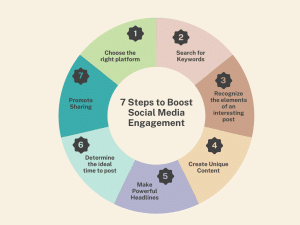
In today’s digital era, social media has become an essential tool for businesses of all sizes. It provides a platform to connect with customers, build relationships, and drive sales. However, with so many businesses vying for attention, it can be difficult to stand out from the crowd. That’s where social media engagement comes in.
Engagement is a measure of how well your content is resonating with your audience. It includes factors such as likes, comments, shares, and clicks. When people engage with your content, it shows that they’re interested in what you have to say and that they’re more likely to remember your brand.
There are a number of things you can do to increase social media engagement, including:
- Creating high-quality content that is relevant to your audience.
- Using visuals to break up text and make your content more engaging.
- Asking questions to encourage interaction.
- Running contests and giveaways to generate excitement.
- Responding to comments and messages in a timely manner.
By following these tips, you can increase social media engagement and build stronger relationships with your customers.
In addition to the above, there are a few other things you can do to improve your social media engagement:
- Use social media analytics to track your engagement metrics and see what’s working and what’s not.
- Experiment with different types of content and see what your audience responds to best.
- Optimize your content for mobile devices, as more and more people are using social media on their phones.
- Promote your social media content on other channels, such as your website and email newsletter.
By following these tips, you can improve your social media engagement and reach a wider audience with your content.
Types of Social Media Campaigns:
Businesses can leverage different types of campaigns on social media to achieve their marketing goals. These campaigns can range from brand awareness initiatives to lead generation, sales promotions, and fostering meaningful customer engagement. Each campaign type serves distinct purposes and requires tailored strategies for optimal results.
Brand awareness campaigns are designed to increase brand recognition and awareness among target audiences. These campaigns typically use a variety of social media marketing tactics, such as:
- Publishing high-quality, engaging content that is relevant to your target audience
- Using social media advertising to reach a wider audience
- Running contests and giveaways to generate excitement and buzz around your brand
- Leveraging social media influencers to promote your brand
Lead generation campaigns are designed to generate leads for your business. These campaigns typically use lead magnets, such as:
- Ebooks
- Whitepapers
- Checklists
- Coupons
- Webinars
Once you have generated leads, you can nurture them through a series of follow-up emails and social media interactions to convert them into customers.
Sales promotion campaigns are designed to drive sales of your products or services. These campaigns typically use a variety of social media marketing tactics, such as:
- Offering discounts or promotions
- Running contests and giveaways
- Promoting your products or services through social media advertising
Customer engagement campaigns are designed to build relationships with your customers and foster loyalty. These campaigns typically use a variety of social media marketing tactics, such as:
- Answering customer questions and inquiries
- Responding to customer comments and reviews
- Running polls and surveys to get feedback from customers
- Hosting live Q&A sessions with customers
By leveraging the different types of social media campaigns, businesses can achieve a variety of marketing goals. By tailoring each campaign to its specific purpose, businesses can maximize their results and achieve their desired outcomes.
Understanding Your Audience:
Conducting thorough audience research is pivotal. Understanding demographics, interests, behavior patterns, and preferred platforms enables businesses to tailor content that resonates deeply with their target audience.
Setting Clear Campaign Goals:
Define specific and measurable goals to gauge the success of social media campaigns accurately. Whether it’s increasing brand visibility, driving website traffic, or boosting sales, clear objectives provide direction and facilitate evaluation.
Choosing the Right Platforms:
Not all social media platforms are created equal. Businesses must identify the platforms where their audience is most active and align with their campaign objectives. Each platform has its unique user base and content formats, making a tailored approach crucial.
Developing Engaging Content:
Creating diverse and compelling content is key to capturing audience interest. Experimenting with various formats—text, images, videos, live streams—adds dynamism to the content strategy and keeps the audience engaged.
Content Scheduling and Optimization:
Strategically scheduling content for optimal reach is essential. Understanding platform algorithms and utilizing features like hashtags, stories, and scheduling tools enhances visibility and engagement.
Social Media Analytics:
Leveraging analytics tools provides insights into campaign performance. Monitoring key metrics against set objectives allows for informed decision-making and course correction, if necessary.
Engagement Tactics:
Incorporating interactive elements like contests, giveaways, polls, and collaborations with influencers drives audience participation and fosters community engagement.
Community Management:
Building a positive online community involves actively engaging with the audience by promptly responding to comments and messages. Building trust and rapport enhances brand loyalty.
Collaboration:
Partnering with other brands and influencers can widen a brand’s reach and amplify its awareness. Strategic collaborations that align with campaign goals can yield mutually beneficial results.
For example, a fashion brand might partner with an influencer who is known for her stylish sense of dress. The influencer could wear the brand’s clothes in her social media posts, which would expose her followers to the brand and potentially drive sales. The brand could also benefit from the influencer’s insights into the fashion industry and her ability to connect with her followers on a personal level.
Another example of a strategic collaboration is when two brands with complementary products or services team up to offer a joint promotion. For example, a coffee shop might partner with a bakery to offer a special deal on coffee and pastries. This type of collaboration can attract new customers to both brands and increase sales for both parties.
When partnering with other brands and influencers, it is important to carefully consider the goals of the collaboration and to ensure that both parties are aligned. By working together, brands can achieve their marketing goals and reach a wider audience.
Conclusion:
Crafting effective social media campaigns demands a deep understanding of the audience, clear goals, engaging content, and constant optimization. By implementing these strategies, businesses can enhance engagement, build a loyal following, and achieve their marketing objectives. Continual monitoring, adaptation, and creativity are key to sustaining success in the ever-evolving realm of social media. You can visit this link for further information https://www.productleadership.com/resources/guides/mastering-social-media-marketing-strategies-for-impactful-engagement/#:~:text=Crafting%20Your%20Social%20Media%20Marketing%20Plan&text=Determine%20Your%20Content%20Strategy%3A%20Decide,strategy%20based%20on%20performance%20data. Remember, this comprehensive guide aims to equip businesses, marketers, and social media managers with actionable insights to elevate their social media game. Embrace experimentation, stay updated with industry trends, and continuously learn and adapt to stay ahead in the competitive social media landscape.
Additionally, for further learning and insights, resources such as industry articles, recommended books, and online courses can provide deeper knowledge and expertise in crafting impactful social media campaigns. By implementing these tactics, Gurkha Tech can enhance engagement, build a loyal following, and achieve marketing objectives. Stay updated with industry trends and embrace creativity to succeed in the competitive social media landscape.
📚 For more insights, check out our digital marketing strategies in Nepal.


